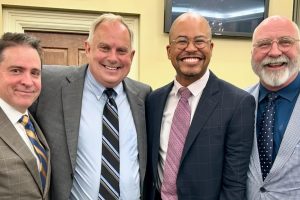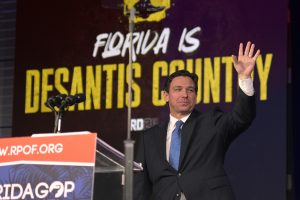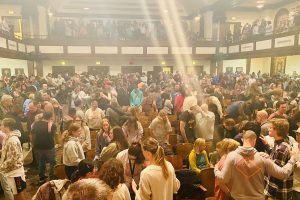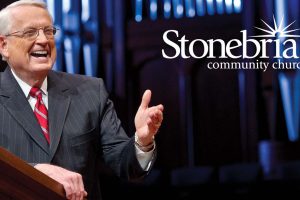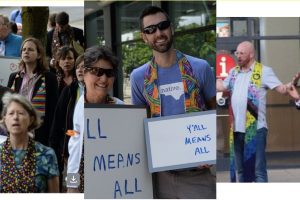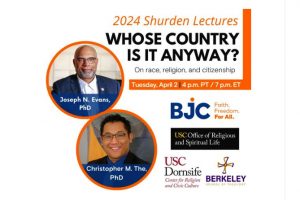 While Millennials are less churched than most generations, data has shown they are no less spiritual. So why aren’t they in our pews? The longer I have examined this question, the more I’ve been convinced it is the wrong one. Instead of bending over backward to try and attract Millennials to our churches, what if we considered how we could best minister to and with Millennials?
While Millennials are less churched than most generations, data has shown they are no less spiritual. So why aren’t they in our pews? The longer I have examined this question, the more I’ve been convinced it is the wrong one. Instead of bending over backward to try and attract Millennials to our churches, what if we considered how we could best minister to and with Millennials?
So, this article is not fundamentally about drawing in Millennials, but to minister to them and involve them in our communities of faith. Here are a few bits of advice for your church from a Millennial minister who knows a lot of Millennials, has ministered alongside them as colleagues and peers, and is concerned about the future of this generation (and those following) in our churches.
These reflections stem from a panel at the Cooperative Baptist Fellowship of North Carolina’s General Assembly this year called, “Why church matters (and doesn’t) to Millennials,” hosted by Corinne Causby, a student at Wake Forest University School of Divinity. Four other Millennials, including myself, served on the panel, which will reprise at the CBF General Assembly in Greensboro, N.C., this summer. If you are interested in any of the topics below or have any question, please come and speak with us.
1. Understand their economics.
Mountains of student (and other) debt, the unfulfilled promise of unpaid internships, lack of full-time permanent positions, and dwindling income growth are just a few of the realities that characterize Millennials’ economic life. Millennials are often unable to attain traditional markers of adulthood that other generations have taken for granted. Home ownership, independent living, marriage, children and saving for retirement are not choices available for a significant number of Millennials.
Two quick examples bring this reality into stark relief. First, at the CBFNC, one panelist asked the audience to raise their hand if they had been told they must do unpaid work or an unpaid internship to advance their career. Every Millennial raised their hand; no one else did. Second, consider this quick fact: in most of the developed world, retirees have seen more disposable income growth than those under 30. Entry-level jobs either are not available to many Millennials or they do not pay very much. That has not been the historical trend for an entire generation before.
There are innumerable reasons behind these trends, but regardless they wield significant influence on Millennials’ social, fiscal and even spiritual patterns of life. Churches, their ministers and members, need to fully grasp the potentially devastating implications of Millennials’ dire financial straits if they would like to minister to them well. The Guardian is currently doing an in-depth investigation into the lives of Millennials around the world that would be helpful in this respect.
2. Embrace their suspicion of institutions.
Every generation has what I am going to call core social memories, widely recognizable events that had a significant effect on shaping the consciousness of a generation (think Pearl Harbor or Watergate). Millennials’ core social memories include 9/11, the war in Iraq, and the financial collapse of 2008, among other catastrophic events that ruined any institutional faith Millennials had. All of these events (most watched live on television) convinced most Millennials that institutions cannot keep them safe, institutions lie and cheat, and institutions don’t care about them.
Whether or not they should, our churches often behave like institutions: preserving the status quo, requesting unearned trust, and establishing hierarchies of authority and power. Whereas previous generations may have had the luxury of trusting the church to be a safe, supportive and loving community, Millennials have too many reasons to doubt those once widely-held axioms. Millennials distrust such communities, and churches that want to minister to Millennials may need to look at how they have idolized themselves as an institution and explore where they can find new life in new expressions of community. Groups like Fresh Expressions, the Parish Collective, and the Slow Church movement are actively exploring new ways of church your congregation might find helpful.
3. Reject the myths about Millennials.
The most widespread icon of the Millennial generation is the participation trophy (though I think the unpaid internship is a more potent and revelatory symbol). The participation trophy is a material representation for all the accusations that Millennials are soft, coddled and lack fortitude. Most myths about Millennials stem from that basic premise: they have thin-skin, no work ethic and are relentlessly entitled.
Most Millennial myths stem from an almost-right observation but a total misreading of the phenomenon’s source. Millennials’ thin-skin, derided often as insidious “political correctness,” is actually a close attention to language paid by Millennials who want our discourse to recognize the humanity and dignity of all our friends, family and neighbors. Millennials’ narcissistic insistence on finding a “fulfilling” or “satisfying” job instead of one that pays the bills is actually a painful and even cynical realism. In the past, you could work a job at normal hours and pay the bills, save for retirement, and have some modicum of leisure. Millennials’ haven’t seen businesses follow through on those promises anymore, so why be miserable if it’s not paying the bills anyway?
Those are just two examples (you can find more here); but with every preconception you have about Millennials, consider digging a little deeper (preferably with some Millennials) and find out what’s really happening. You might be surprised.
4. Go digital — for the right reasons.
Going digital is a must. Churches have often made this their first step in appealing to Millennials, but they do it for the wrong reason. Going digital isn’t about relevance; it’s about accessibility. It would have been absurd in the 20th century to avoid the telephone as a means of communication and organization, yet many churches struggle sometimes to understand that the same thing can be said of the Internet in the 21st century.
My advice for churches looking to figure out the digital world is simple and threefold. First, make yourself easy to find. A good church website is a basic requirement now, as is some basic social media presence. Please, don’t feel like you need to do every app that gets popular, but invest in the basic ones — Facebook and Twitter, for example.
Second, make sure your church is easy to understand. Your Internet presence is often the first interaction you have with a Millennial. Make things like dress code, location, where to park, worship style, where classes meet, timing, and even important beliefs clear. Ask yourself, if you went to your church’s website as a visitor, what would you look for?
Third, make engaging with the church easier for Millennials through digital organization and communication. Find out how giving, event organizing, planning, and communication can be done on the smartphone or web browser — it’s not as hard as you think. Millennials rely on the digital world as their social infrastructure. Don’t ignore it.
5. Do what you do best, and do it well.
I hope that this piece of advice lets many churches breathe a collective sigh of relief. Consider the worship style question. When your worship style changes in a thinly-veiled attempt to lure Millennials into your congregation with guitars and smoke machines, Millennials can smell the inauthenticity from miles away. You don’t need to change everything about who you are as a congregation to minister to Millennials. To continue with the worship style example, be true to your identity. If you’re good at hand bells, chamber music, organs, or even acoustic guitar, do what you do best and do it well. Do what you do with joy, authenticity and sincerity, and most Millennials will love what you’re doing.
But in doing your thing well, don’t make excellence the top priority. Sure, you need to clear a certain bar of quality most Sundays. But instead of making perfection the highest priority, try making participation central to your worship planning. In all the worship services I have led, the best ones for Millennials have been the ones with the most participation by the most people in the congregation. Use their gifts, talents and passions in worship — their art, music, voices, etc. There’s no one-size-fits all for ministering to Millennials in worship; instead, find what’s authentic and engaging for your church — and do that well with all the participation you can muster.
6. Have hard conversations, but don’t assume you’re always right.
Since we know a Millennial’s economic situation is likely fraught, we know the little time they have is valuable currency. Therefore, Millennials likely will not be willing to invest in our congregations if we are not having important conversations. For some, this is code for becoming more liberal to accommodate Millennials’ ideological preferences. That’s not the case. Not all Millennials are liberal — many are conservative or moderate. However, most Millennials want to talk about important social and political issues. When churches refuse to talk about items of national conversation like sexuality, race, gender, discrimination, drugs, alcohol, climate change, etc., it is a signal to Millennials that this community may not be worth the crucial time investment.
Millennials see many of the issues churches are hesitant to talk about as items of vital importance for the future that it is their burden to shape. So, to minister to and with Millennials, explore how your church can broach these important conversations. And do not always assume your church already has the right answer. Chances are, the church is actually a lot more divided on most issues than we first suppose and there is space for fruitful dialog. But that requires everyone (Millennials included) coming in without the assumption that they are right and others are wrong. Fostering a space conducive to important dialog and reflection is vital for ministering to the next generation (and, I would argue, every generation).
Why are any of these six suggestions important? Why is this topic important? Millennials are now the largest generation in the United States. Our churches’ pews are mostly filled with those over 50, but their share of the population is naturally shrinking. Churches should not ignore the largest generation since the Baby Boomers. Further, the first cohorts of the generation that comes after Millennials have already been born. If the church hasn’t taken steps to minister to and with Millennials, what chance do they have of ministering to subsequent generations?
These adjustments require some change (though maybe not as much or the same order of change we once thought), but these shifts may be necessary for our churches to remain faithful to their mission in the world.







